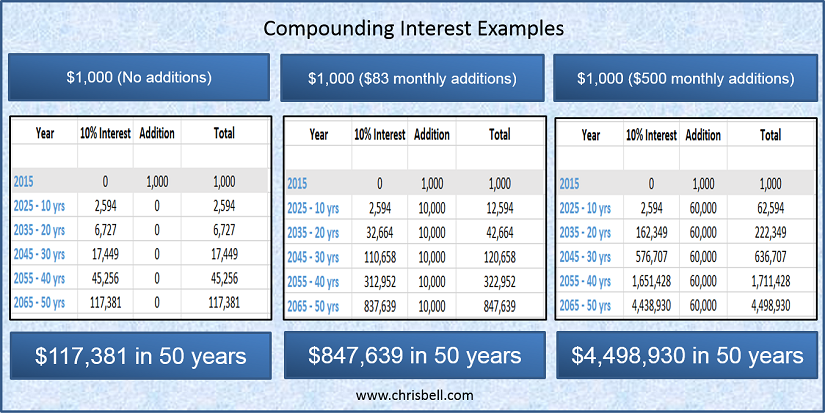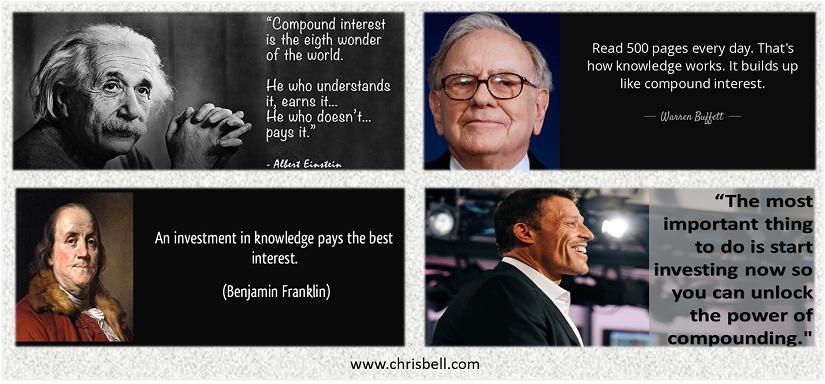 |
Chris Bell | 'There are tons of different factors that go into ranking well, but the biggest is high quality content.' |
| - David Sinick |
 |
Chris Bell | 'There are tons of different factors that go into ranking well, but the biggest is high quality content.' |
| - David Sinick |
I've spent 12 years after my 21st birthday investing my savings into real estate because I've always wanted to survive on rental income as a full time job. Even though real estate is the retirement plan I think about, I also have a Simple IRA that I contribute to at work. A Simple IRA is different from a 401K plan because I'm allowed to invest the money in particular stocks such as Google if I choose to. I add my contributions to the symbol SPY which is an index fund with low fees that follows the S&P 500 index of the 500 largest companies in the US. Aside from my current contributions to a Simple IRA and real estate, I'd like to start thinking about compound interest. Albert Einstein says that it's the eighth wonder of the world and Warren Buffett has followed the strategy since he was 10 years old. Warren Buffett doesn't like to sell his investments, he continues to buy more. When you sell a stock or a home the IRS will want a portion of the profits (capital gains tax), so the longer you keep your asset the faster it grows by compounding on itself. Also, if you cash out $10,000 in profit, then pay 30% in tax, your next investment needs to grow 30% to get back to even. Selling an investment when you're 65 is different, you pay tax once and use the money without trying to invest in something else to recoup the taxes and fees you paid.
It's easy to avoid capital gains tax, never sell anything.

Investopedia says, "Compounding is the process of generating earnings on an asset's reinvested earnings. To work, it requires two things: the re-investment of earnings and time." Don't think about how you're going to spend it as it grows, think about compounding a savings account that can never be touched, until you actually retire and decide to use the money you pull out. The power of compounding ends when the money comes out of the account, in fact, money doesn't have to continuously enter the account for it to continue to grow. Just leave it alone, your money is working hard for you so don't interrupt it.
Listen to your mother. You can look, but don't touch.
Millionaire Teacher
Millionaire Teacher is a great book that discusses compound interest and how to put your money into 3 stock symbols that diversify your account to the maximum potential. The author, Andrew Hallam, says, "choose a monthly figure that you can save, and split it between a US stock market index (VTSMX), an International stock market index (VGTSX) and a Bond index (VBMFX)" (Hallam, pg 102). As you increase in age you should put less money into the US market and more into the Bond market because the bond market isn't as volatile. If you're 65 years old you can't wait for the dips to rise again, but if you're young you have plenty of time. Those 3 symbols are specifically chosen to limit the annual fees you'll pay in other mutual funds. Don't ask your financial adviser, simply add even amounts of money to each symbol for an average of 10% compounding interest over many years. There are also Index-Based CDs offered by JP Morgan that protect 100% of the amount you contribute and follow US Market index funds (S&P 500 or DJIA) and give you 90% of the upswing. You literally can't lose the principal you add, and have the change for 90% of the upswing. It's a good choice for those of you that want safe investments because it's also federally insured by the government (FDIC) up to $250,000.
Your job is easy because you do it every day. Do something else every day and it will become just as easy.

Chris Bell Real Estate
Real estate provides monthly cash flow that can be reinvested, but it doesn't compound like index funds. If you have a mortgage on a rental property then the rental income is paying more and more of the principal each month which is a compounding effect, but not compound interest. Now that I own 3 pieces of real estate, two rentals pay me enough to live mortgage-free in my primary home, so I plan to diversify by starting a monthly fund that will compound over the next 40-50 years. In order to have a compounding effect in real estate one must reinvest all of the profits into more real estate, however it becomes difficult to obtain a fifth, sixth or seventh mortgage to reinvest the profits.
Real estate has minimums to obtain while index funds will grow forever with small contributions.
References:Investopedia. Investing 101: The Concept of Compounding. Retrieved from: http://www.investopedia.com/university/beginner/beginner2.asp Andrew Hallam (2011). Millionaire Teacher: The Nine Rules of Wealth You Should Have Learned in School. |
Written by: Chris Bell
Chris Bell Real Estate